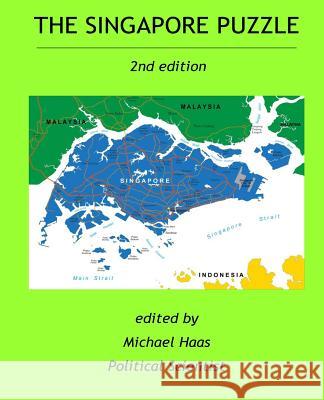The Singapore Puzzle » książka
The Singapore Puzzle
ISBN-13: 9780983962649 / Angielski / Miękka / 2014 / 268 str.
Political scientist Michael Haas brings together essays by six distinguished authors with different ideas about how Singapore might become a full-fledged democracy and has stumbled over the years, exaggerating threats to the government. Book presents a comprehensive history of Singapore, emphasizing why Singapore is an economic success, but leaders took wrong turns that led away from democracy while rationalizating authoritarian rule by claiming that a small city-state was too vulnerable to leave key decisions to chance. An early chapter presents the case for Singapore-wherein the country has been an economic success. Later chapters analyze the following aspects of the political and social life of Singapore to explain how and why the leaders, especially Lee Kuan Yew, abandoned the original goal of a democratic government: Political history - from colonial times to the present, highlighting elections Political economy - the imperatives of a city-state account for the successful economic policies The press - change from a call for press freedom as a colony to press censorship as an independent state The judiciary - the abolition of juries and other ways to prevent judicial independence Foreign policy - vulnerable as a small state, Singapore usually relies on the United States as a protector In addition, the final chapter describes Singapore's mass society (the deliberately constructed gap between the people and the government) and assesses prospects for the future. Heavily footnoted, with a section of References and an Index. xiii + 252 pages. The book presents several unique observations: Data indisputably support Singapore as an economic success but only for foreign corporations. Singapore began as a welfare state in the early years of independence, entitlements were later cut, but now are being gradually reintroduced. Lee Kuan Yew holds the record for the amount of awards collected from successful libel lawsuits. During the 1990s, the government stressed "Asian Values" during conflicts with the United States, but now has dropped the idea. Prime Minister's Goh Chok Tong's desire for a "kindler, gentler" country ended when the son of Lee Kuan Yew was installed as his successor in 2004. Singapore's per capita income is higher than its former colonial power, Britain. Singapore Muslims must take military training but cannot be used in battle with the closest states. Trial by jury was abolished in Singapore in 1969. Judges are way of government leaders. The Singapore press is less free than the press in China. Department heads and judges are paid more than anywhere else in the world. Singapore scores 90 out of 100 on the Human Development Index, measuring quality of life. Torture is routinely used to provoke confessions, even when those charged may be innocent. American policy toward international terrorism has become Singaporeanized. Sijori is the growth triangle involving adjacent parts of Indonesia and Malaysia with Singapore. The Singapore government has created a mass society on the Soviet model. Due to careful planning, there are few traffic jams in highly urbanized Singapore. Singapore has one of the largest percentages of foreign workers in the world, annoying residents. Most Singapore's foreign investment abroad goes to their own firms, especially in China. Many Singaporeans would prefer to leave the country, and many do. Singapore's economic policy is a function of being a trade entrepot, not elitist decision making. Most contributors have been maligned by the Singapore government, but only one was tortured. Table of Contents Preface 1Introduction (Michael Haas) 2Political History (Michael Haas) 3The Case for Singapore (Clark D. Neher) 4Political Economy (Christopher Lingle & Kurt Wickman) 5The Press (Derek Davies) 6The Judiciary (Francis T. Seow) 7Foreign Policy (Richard A. Deck) 8M"











